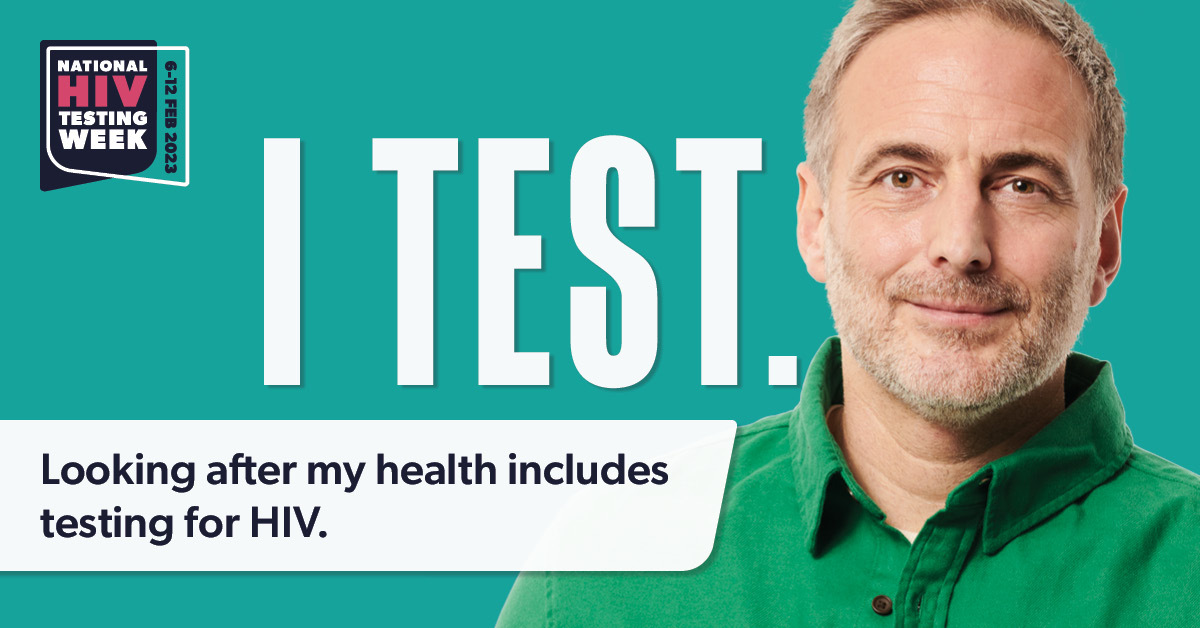South Tyneside Sexual Health supporting National HIV Testing Week: Monday 6th February 2023
WHY NATIONAL HIV TESTING WEEK 2023 IS IMPORTANT
To meet the goal of achieving zero new HIV cases in England by 2030, the Government has outlined a set of ambitious targets within the HIV Action Plan, but to achieve these there is still a lot of work to do: Despite a partial recovery in the numbers testing for HIV in England last year, figures are still 20% below those recorded in 2019.
In 2021, 46% of people first diagnosed in England were diagnosed late. This correlates to poorer long-term health outcomes; in those diagnosed late in England the highest mortality rates were amongst those over the age of 50, and in particular over the age of 65. HIV treatment coverage is high in England at 99% of those seen in care.
To access free treatment and care people need to test so they are aware of their HIV status. Testing for HIV is also useful for HIV-negative people who are considering interventions such as PrEP (pre-exposure prophylaxis).
National HIV Testing Week is a campaign to promote regular testing among the most affected population groups in England. This helps to reduce the number of people living with undiagnosed HIV and those diagnosed late.
The campaign returns with this year, with a new strap line ‘I Test.’ across all National HIV Testing Week campaigns.
Testing for HIV is quick and easy, all it takes is a finger-prick test. People can live with HIV for a long time without any symptoms, testing is the only way to know your HIV status.
If you have HIV, finding out means you can start treatment, stay healthy and avoid passing the virus on to anyone else.
There are many ways to test – at a sexual health clinic, your GP, through HIV and sexual health charities or by calling us here at South Tyneside Sexual Health on 0191 4028168. You can also order a test online from the South Tyneside Sexual Health website.
Anyone diagnosed with HIV in the UK can access free treatment and support.
Why National HIV Testing Week 2023 is important
The number of people diagnosed with HIV fell by a third between 2019 and 2020, but there is still work to do:
1 in 20 people with HIV are unaware they have it, increasing the risk of passing HIV on to sexual partners.
In 2020, 42% of people first diagnosed in England were diagnosed late. This correlates to poorer long-term health outcomes; in 2019, people diagnosed late had more than a seven fold increased risk of death within a year of diagnosis.
The number of people testing for HIV in sexual health clinics decreased by 30% in 2020. It is important to remind people at risk of HIV the importance of regular testing and the options available
What is HIV?
HIV stands for Human Immunodeficiency Virus. ‘Immunodeficiency’ refers to the weakening of the immune system by the virus.
HIV has been passed on between humans for many decades but was only identified in the early 80s.
What is AIDS?
AIDS stands for Acquired Immune Deficiency Syndrome. It is a collection of illnesses (‘syndrome’) caused by a virus people pick up (‘acquire’) that makes their immune system weak (‘immune deficiency’).
You can’t get an AIDS diagnosis unless you’re already HIV positive.
AIDS or late-stage HIV?
In the 1980s and early 90s, most people with HIV were eventually diagnosed with AIDS.
Now, thanks to modern antiretroviral treatment, very few people in the UK develop serious HIV-related illnesses. The term AIDS isn’t used much by UK doctors. Instead they talk about late-stage or advanced HIV.
Untreated HIV and transmission
If left untreated, infection with HIV progresses through a series of stages: from flu-like seroconversion illness, through infections associated with the symptomatic stage, leading to late-stage HIV or AIDS.
If someone with HIV has a detectable viral load, they can pass on HIV through blood, semen, vaginal fluid, anal mucus and breast milk.
HIV is not passed on by spitting, sneezing or coughing, nor by kissing or general social contact.
HIV can’t survive for very long once it’s outside the human body.
Undetectable viral load
Studies have shown that a person who’s on effective treatment who has an undetectable viral load can’t pass on HIV.
If you would like to test for HIV please contact us on 0191 4028191 to book an appointment or order online by visiting Order a STI test kit | SH:24 (sh24.org.uk)

